


The head of the department of Jewish antiquities of the Ministry of Antiquities of Egypt, Dr. Muhammad Makhran, announced the completion of the inventory and inventory of four synagogues and several cemeteries.
Inventory was a preliminary stage of restoration and lasted a whole year. Experts examined the Elijah a-Navi synagogue in Alexandria and the three synagogues of Cairo. Also, an inventory of two Alexandrian cemeteries, where famous rabbis are buried, including.
"After the registration of these facilities, they came under the protection of the antiquities law of 1983 and the amendments adopted in 2010 to it. Earlier, another ten synagogues were added to the list of protected objects, "the Al-Yum Al-Saba newspaper quoted the head of the department.
At the same time, Mahran admitted that the cemeteries are in desolation, and noted that there are no separate historical monuments on their territory. According to him, the cause of desolation is the mass emigration of Egyptian Jews after the Israeli aggression of 1956.
Archaeologist Sameh al-Zahar recalled that for many centuries Egypt was a real home for Jews. The Jewish community of Egypt reached its peak in the time of the Fatimids. He said that RAMBAM, who moved to Egypt in the 12th century, became Salah ad-Din's personal doctor.
Recall that the restoration of the Alexandria synagogue Eliyahu a-Navi Egyptian government allocated 22 million dollars. The historic building is in an emergency condition, for several months the roof collapsed.
The synagogue was the central prayer house of the Jewish community of Alexandria and one of the largest in the Arab world. It accommodated 700 people. It was built in the middle of the fourteenth century, but was seriously damaged in 1789, when Alexandria was taken by the French army that had landed in Egypt under the command of General Napoleon Bonaparte.
The current building in an eclectic style was erected in 1848 by the architect Leon Barcillon. The project was financed by the Egyptian pasha Muhammad Ali. For a long period of service there were not conducted, but the synagogue was open on weekdays.














